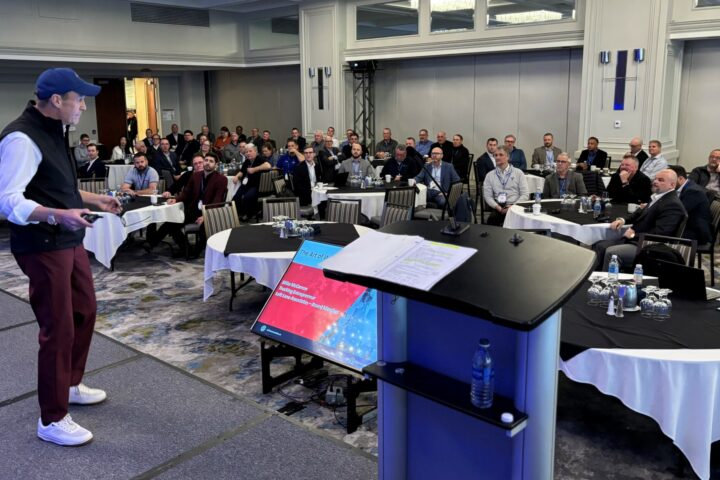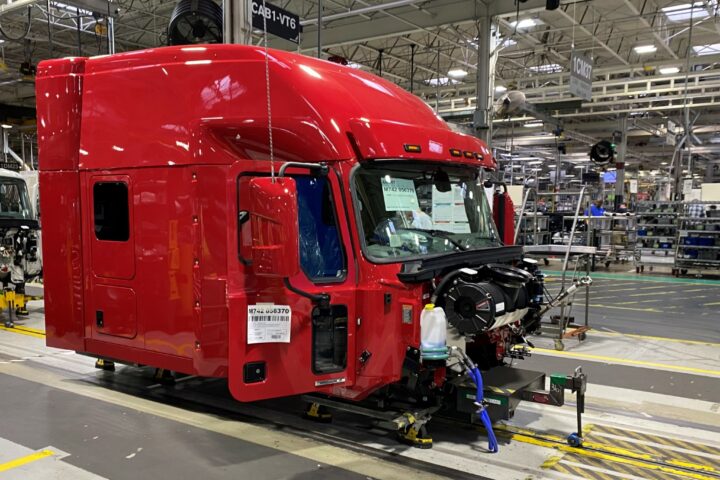Trucking companies should think like the Toronto Blue Jays and advance one base at a time.
Sales success comes from hitting singles, or building steady, sustainable growth through small, disciplined wins, Mike McCarron, founder of Left Lane Associates told attendees at the Atlantic Provinces Trucking Association’s annual general meeting and conference in Halifax.
Drawing parallels to the Jays’ patient, methodical style, he said too many salespeople swing for home runs instead of advancing their customers and relationships step by step.

McCarron, who titled his presentation The Art of War for Trucking Sales, used lessons from Sun-Tzu’s ancient text to describe how strategy, preparation, and persistence can help carriers survive today’s brutal market. He described the industry as being “at war,” citing falling freight rates, broker pressure, rising costs, and driver shortages.
He said many fleets are simply trying to hang on. But the mistake, he argued, is that when business turns down, companies stop selling. They cut sales budgets, eliminate lunches, delay technology investments, and retreat. In his view, downturns are the best time to go on the offensive — when competitors are quiet, the groundwork laid through prospecting and new relationships will pay off as conditions improve.
McCarron disseminated his message in three phases: preparing for the battlefield, fighting smart, and expanding territory.
Effort pays off
Preparation, he said, begins with culture and process. The winners are companies that calculate, plan, and build predictable systems for finding and converting prospects.
At his former company, MSM Transport, McCarron said he could track results precisely: every 100 prospects produced 30 shipments, which became five long-term customers. Sales, in his words, follows the “law of large numbers”. You can’t control the outcome, but you can control how much effort is put forth.
He urged fleets to think in terms of lifetime customer value rather than single transactions. One load, he said, doesn’t matter nearly as much as securing a recurring relationship that brings steady revenue, rate increases, and referrals. Too many carriers, he warned, think in terms of one load at a time instead of seeing each account as a long-term asset.
Tools and data
In today’s market, McCarron argued, salespeople need better tools and data. “You’ll never win a war without the right weapons,” he said. Customer relationship management (CRM) systems, he explained, are essential to track conversations, actions, and personal details that build trust. Sales intelligence shouldn’t live in a rep’s head, it should reside in the company’s system, where it’s organized, measurable, and transferable.
He also said artificial intelligence is changing the sales process and should be embraced, not feared. Used properly, it can handle routine research, planning, and follow-up, allowing salespeople to focus on building relationships. Social media, he added, is an untapped research tool that reveals what people value and how they think. This is information that can open conversations and strengthen rapport.
Personal connections
Even with digital tools, McCarron said nothing replaces personal connection. He urged carriers to revive the tradition of taking customers to lunch or buying event tickets, calling it an investment rather than an expense. In an era in which in-person contact is rarer, he said small gestures and consistent communication stand out.
Knowing competitors is another part of “preparing the battlefield.” McCarron recommended regular SWOT (strengths, weaknesses, opportunities, threats) analyses to help fleets understand where they can differentiate themselves and where they’re vulnerable. He said every employee, from dispatchers to drivers, should be able to explain what the company does in one clear sentence. Confusion about identity, he warned, creates weakness.
Provide solutions
Fighting smart, McCarron said, means choosing battles carefully. He cautioned against competing solely on price, arguing that customers usually leave over service failures, not rates. When mistakes happen, carriers should have a clear recovery plan. If a load is delayed, the customer should hear it from the carrier first, along with an immediate solution. “If they call you, it’s a problem. If you call them, it’s a solution,” he said.
He also encouraged salespeople to maintain regular contact with prospects and customers through small, meaningful gestures like handwritten notes, anniversary cards, or phone calls. The best opportunities, he said, come from existing relationships. “You’ve got a one-in-two chance of growing business with a current customer,” he noted, compared with one in 50 when chasing new ones.
Brokerage
To build long-term resilience, McCarron said fleets should consider adding brokerage operations to diversify revenue and strengthen customer relationships. Strong companies, he said, don’t wait for trouble. They build fortresses before the battle begins.
McCarron closed by returning to his baseball analogy: success in sales is about patience and momentum. Like the Blue Jays moving base by base, carriers that play the long game will eventually bring runs home.













